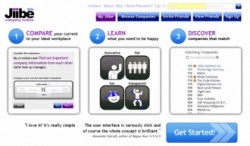Here’s a company that’s set itself the goal of helping people lead happier lives and helping companies build happier and more productive workplaces. When Jiibe Solutions (profile; site) has accomplished those tasks it may as well just go on to create peace on earth.
Greg Scott, co-founder and CEO, harbors no illusions about the challenge he and his partner, Stephen Race, have set for themselves. “Well,” he said, explaining his vision, “it takes some companies a while to  understand the value of being entirely open. It’s still a small percentage, but I was quite surprised (at how many do).”
understand the value of being entirely open. It’s still a small percentage, but I was quite surprised (at how many do).”
What he’s talking about is Diialog, a sort of company-wide 360 assessment that takes the measure of company culture. It’s designed to reveal the culture as it is and compare it to the culture employees — and company leadership — desire it to be. In its purest form, the results would be reported to the entire company and made available on Jiibe.com, a site that matches jobseekers to companies based on “fit.”
There are categories for management style, vision, and social consciousness; 10 factors in all. When enough employees complete the assessment, the results can be revelatory, showing the gaps, as well as the company strengths.
“I kind of think of this like management by wandering around,” says Scott, referring to the communications that open up when executives hit the plant floor and talk with the troops.
Founded in 2007, Jiibe Solutions (a takeoff on jibe, meaning to be in harmony or agreement) has two products:
- Diialog is the flagship product. It’s a proprietary corporate assessment survey completed by a company’s employees. It produces a profile of the culture and environment its employees experience as well as producing a composite portrait of the workplace they desire. The tool is intended to be a continuous sort of self-assessment that shows where the gaps are and helps company leaders address them.
- Jiibe.com is the completely free self-assessment tool that helps individuals discover the kind of
 culture and work environment that best fits them and then matches them against suitable companies. It is essentially a generic version of Diialog.
culture and work environment that best fits them and then matches them against suitable companies. It is essentially a generic version of Diialog.
<!–[if gte mso 10]>
<! /* Style Definitions */ table.MsoNormalTable {mso-style-name:"Table Normal"; mso-tstyle-rowband-size:0; mso-tstyle-colband-size:0; mso-style-noshow:yes; mso-style-parent:""; mso-padding-alt:0in 5.4pt 0in 5.4pt; mso-para-margin:0in; mso-para-margin-bottom:.0001pt; mso-pagination:widow-orphan; font-size:10.0pt; font-family:"Times New Roman"; mso-ansi-language:#0400; mso-fareast-language:#0400; mso-bidi-language:#0400;} –>
Jiibe’s data comes from surveys completed by users of the site and, in some instances. from the internal Diialog surveys undertaken by Jiibe Solutions’ clients. Most of the companies on the Jiibe site have only one or two survey respondents; too few, Scott acknowledges, to provide any statistically reliable data. “These are interesting,” he says, “not scientifically valid, but a point of discussion.”
His hope is that as more companies participate (in a Diialog survey) they will be as open as Quicken Loans to make the results available on Jiibe. “They have great openness,” Scott says.
The value for a company in performing this psychoanalysis, according to Jiibe Solutions, is that those “willing to be this open and engage their employees are the ones that are most able to quickly adapt to a very dynamic and competitive marketplace.”
The founders have years of experience in the recruitment field. Greg Scott founded an early online ATS company (Vision2Hire.com) which he sold in 2004 to Canadian IT staffing and recruiting firm Brainhunter Inc. A serial entrepreneur, he founded and ran a theatrical production company in Las Vegas, before launching Jiibe Solutions.
His partner, Stephen Race, is an occupational psychologist with a decade of experience working on recruiting assessments and issues of cultural “fit.”
The two worked together for a brief period at Talent Technology (profile; site), best known for its HireDesk ATS.
The challenge for Jiibe Solutions is the same every user-dependent Web 2.0 site has: Getting a large enough number of employees to participate to make the results statistically meaningful.
Thus, says Scott, a priority for the company is to “partner with other groups that have benchmark data.” observes Scott.
As Scott told one blogger, “The beauty of this is that we’re taking advantage of the crowd and turning the traditional job search on its ear.”